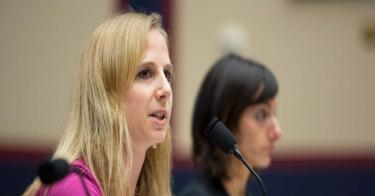The U.S. Senate Committee on Banking, Housing, and Urban Affairs recently called on Heritage Foundation research fellow Rachel Greszler to testify on unemployment insurance and fraud in relation to the COVID-19 pandemic.
During the hearing, Greszler discussed why the increased pandemic unemployment insurance benefits resulted in a surge of unexpected fraud.
“By putting an unprecedentedly high dollar value on unemployment insurance benefits, making them available for three times as long as usual, widening eligibility, and reducing verification requirements,” Greszler said, “unemployment insurance benefits were not only abused by some individuals, but they became a high value, easily accessible target for criminals.”
She stated that the expansion of benefits had been “exploited by criminals with total benefit payments far exceeding policymakers’ intent.”
“In a single year, the number of identity theft reports filed with the FTC by individuals whose information was used to obtain government benefits or documents increased 27-fold—from 23,000 theft reports before the pandemic to 637,000 the year after. Instead of just helping individuals who lost jobs and incomes, much of the expansion instead fueled fraud,” Greszler explained.
During her testimony, Greszler offered her analysis on the sizable amount of taxpayer dollars lost to fraud and the magnitude of identity theft. She emphasized the individual misuse, abuse, and fraud of the unemployment funds:
“My analysis of the Department of Labor’s data shows that UI programs sent out 1.365 billion weekly benefit checks between April 2020 and May 2021 when covering 100% of all unemployed workers—an optimistic goal of the UI expansions—would have required only 807 million benefit checks. So that’s an excess of 557 million UI checks and $357 billion of taxpayers’ money sent to people—likely criminals—who weren’t unemployed.”
Greszler recently released a report that warns the unintended consequences from the unemployment program expansions during the pandemic should make lawmakers think twice before making these programs permanent, and before creating even more large government benefit programs that would simultaneously up the ante for criminals, and create new avenues for individuals’ and children’s personal information to be exploited.
She ended her testimony by advising lawmakers: “Rather than requiring individuals to pay higher taxes and disclose their personal information to multiple government programs to receive what politicians think they need to support their families, lawmakers should instead let Americans keep—and freely save—more of their own money, so that they can use it on the things they want and need, without the restrictions of government programs, and without putting their personal information at risk.”
Greszler writes and speaks regularly on jobs and labor as well as social security. For more of her writings on these issues, click here.
